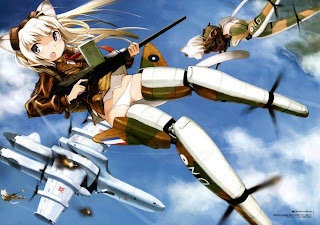Is anime the quintessential medium for telling science fiction stories?
Isn't it obvious?
The question sprang to mind the other day, after checking out one of my absolute favourite movies, Summer Wars. What's that, you say you've never heard of Summer Wars? Well, that's no surprise, since it's an anime and, unlike Evangelion, hasn't ever played on a big screen in North America. On the surface, Summer Wars is about the omnipresence of technology, and the threat of a rogue AI. Or, actually, it's a young man's coming-of-age story. Or a family drama. Or a love story? A comedy? A meditation on the role of the elderly? A warning about the depersonalizing nature of modern society?
Really, it's all of those things, and probably one or two more that I, having already watched it several times, haven't quite managed to catch yet. And that is why, I think, anime may be producing the best science fiction stories at the moment, certainly the best on film or video. Partly there are obvious reasons for that, like the simplicity of depicting non-terrestrial locations or biologies in animation, or the relative cheapness of fantastical effects. But there's more to it than that, and I think what it comes down to, in the end, is the trouble I had in explaining exactly what Summer Wars is 'about'.
This is Summer Wars, for the record. Yeah. Both of them.
See, that's not a problem you get in North American science fiction. Think of the big science fiction movies. What are they about? In Time is about how awful capitalism is, and a bit of a love story. The various Avengers lead-in movies are about superheroes doing classically superheroic things, like learning humility and punching Nazis. District 9 is about racism and prejudice. The Matrix series is about a war between humans and machines, and also fate vs. free will. I Am Legend is about isolation and the need for human contact, and if you've got the version with the better ending, mutual respect. The Transformers films are about two movies too many. Simple.
Now, what is Ghost in the Shell about, exactly? Or The Girl Who Leapt Through Time? Or Akira? Or Voices of a Distant Star? All of these movies have an obvious plot, just like North American films do, but they've got not just one sub-plot running, but several, and usually they're quite well done, too. And sadly, that's not really something you see in North American science fiction anymore. The Matrix, the first one, might justly be hailed as a stylistic and technical trend-setter and a relatively deep man vs. machine/man vs. society story, but Neo has no real character growth, nor do any of the other characters, all of whom are basically interchangeable and forgettable, and the love story is, frankly, embarrassing. If it weren't for Hugo Weaving, I'm not sure the whole thing would've got off the ground.
I kid, of course, but only about that last part. The more North American science fiction I consume lately, and I'm talking largely about films but television doesn't escape this either, the less impressed I find myself. Or, perhaps I should say the less challenged. It just seems as though the storytellers can't be bothered to really stretch themselves. Story after story, lately, is the same; a not-too-young disaffected/outcast male who finds himself pushed to become some kind of decisive figure, usually with a love story tacked on there and perhaps with a token bit of character growth. Where are the family dramas? Where are the meaningful love stories? Where are the comedies? The funny ones, I mean; Bay's Transformers absolutely do not count. And yes, I know there are exceptions, and that even some of those films that aren't exceptions are great films, just because they managed to do the one or two things they did really, really well. I still stand by my accolades for In Time, absolutely. But, for instance, why was Sylvia Will's age, instead of being his grandmother's age? It wouldn't matter in terms of casting, or the aesthetics of them as a couple on screen, but that small change could add such an interesting extra little touch to their admittedly formulaic relationship. It's those sorts of small things that science fiction seems to miss, time and again, to the detriment of their stories.
Behold, the romance of the summer (blockbuster)!
For all its translation and localization and dubbing issues, and for all its very real problems in terms of the portrayal of women, anime is simply the superior medium when it comes to telling science fiction stories. And the reason seems to be, at the end of the day, that anime directors and producers actually still care about telling really good stories that just happen to be science fiction, rather than science fiction stories that just happen to be good.
It's such a tiny thing, but it makes all the difference in the world.



No comments:
Post a Comment